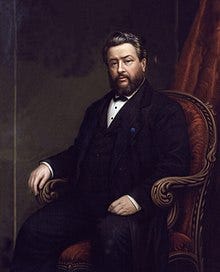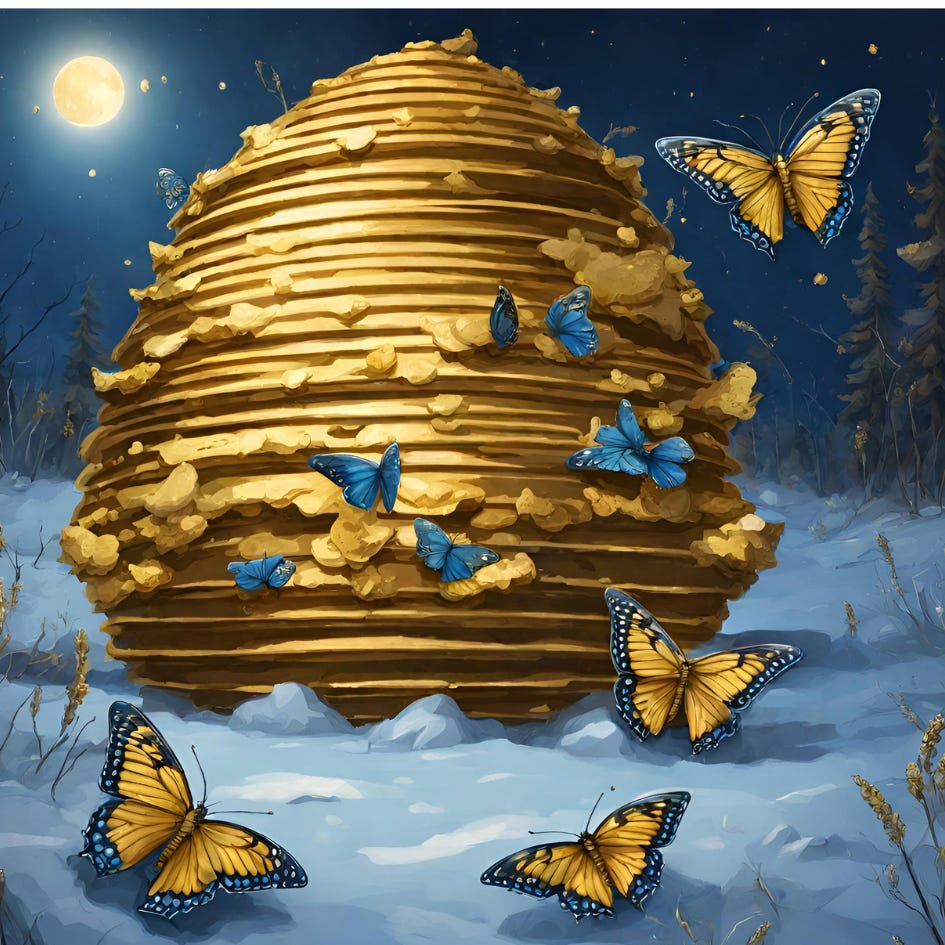7 Reasons to Stop Being Lazy in 2024
Tips from a self-help book from 1895
Men ride stags when they hunt for gain, and snails when they are on the road to heaven.
-Charles Spurgeon, Talk and Pictures (1895)
The setting: a rare bookshop like something out of an Indiana Jones montage that can’t help but conjure visions of a zesty trio of globe-trotting detectives tracking down the truth about a lost civilization.
The location: Argosy Bookstore, founded in 1925 and located just a few blocks east of Central Park in New York City.
The bargain bin: spilling with dry-shell husks of forgotten hardcovers.
The book from the pile: Talk and Pictures (1895) by John Ploughmann.
The lessons? Unforgettable.
The author? Not even John Ploughmann. Talk and Pictures is written by Charles Haddon Spurgeon, (1834-1892), a Baptist preacher from Kelvedon, England, who wrote under “John Ploughmann” for marketing purposes, because Spurgeon thought the name would resonate with common people.
And he would be absolutely furious if he knew how lazy you were planning to be on 2024.
The sweeping objective of Talk and Pictures is to make people ashamed of having vices until they stopped. It’s a self-help book from the late 1800s and, in the first chapter, reminds us all that to be lazy is to be demonic. Going into 2024, it’s valuable to reflect on what I believe to be Spurgeon’s key lessons on the evils of idleness. Here’s what he has to say:
1. Laziness is Greed.
Feel like you deserve a break? Rewarding yourself with a few episodes of forgettable television or a baker’s dozen of Instagram Reels or Tik-Toks?
You deserve some lashes for your indulgence. As Spurgeon explains:
Every man out to have patience and pity for poverty; but for laziness, a long whip.
Not only do you deserve some measured agony, your greedy laziness makes you ugly:
The ugliest sight in the world is one of those thorough-bred loafers, who would hardly hold up his basin if it were to rain porridge, and for certain would never hold up a bigger pot than he wanted filled for himself.
In not contributing with the full vitality of your lifeforce to life itself, Spurgeon declares you are both useless and greedy.
2. Idle People are Swamp Creatures.
What is the sensation of being idle? Of being lazy?
Think stinkier. Sludgier. More frogs and mosquitoes. Spurgeon writes:
[Idleness is] a sort of mud which breeds no eels, a dirty ditch which would not feed a frog.
In short: inertia is stagnation. In stagnation, we lose the self to the swamp. Roasting those suffering this fate, Spurgeon declares of the lazy:
The biggest pair of spectacles in the parish could not see anything in you worth talking about.
3. Earn Your Leisure and Don’t Overdo It.
Spurgeon wants to make it clear to the gentle ploughmen and ploughwomen audience of Talk and Pictures that life isn’t just toil: it can be fun. If you earn it. This is where he starts to humblebrag about just how busy he is and why, when he relaxes, it’s different. It’s cheese. Not chalk.
I like leisure when I can get it, but that’s quite another thing ; that’s cheese and the other is chalk.
In other words, relaxation is different when he does it.
Maybe there’s something to the idea that some leisure is cheese and some is chalk. Whatever that meant in 1895. Maybe deep, engaging acts of leisure that are constructive, creative, and active count as leisure in his world, but quick acts of consumption and stimulation are not.
What, really, is leisure and what is laziness? Where is your line?
4. Follow Through, and Follow Your Instinct.
Clearly explaining symptoms that would be classified as ADHD by self-help videos on Instagram and Tik-Tok, Spurgeon closes in on the biggest vice of the idle: half-finished projects and a lack of work-life boundaries.
Idle folks never know what leisure means ; they are always in a hurry and a mess, and by neglecting to work in the proper time they always have a lot to do.
The price of an idle life becomes paying it forward, forever. To be virtuous is to find your focus.
5. Climbing the Ladder with No Conviction = Monkey Business.
Later in Talk and Pictures, Spurgeon turns on the upper classes:
Many of our squires have nothing to do but to part their hair in the middle; and many of the London grandees, ladies and gentlemen alike, as I am told, have no better work than killing time.
He pities them, rather than condemns them:
I cannot be angry with these people somehow, for I pity them when I think of the stupid rules of fashion which they weary out their days.
The idle of the upper classes are decorative. The idleness is not inactivity, but activities that are all a weary waste to keep up appearances. It is this wasted energy that is most embarrassing of all, because it elevates both vice and vessel.
Now they say the higher a monkey climbs, the more his tail I seen ; and so, the greater these people are, the more their idleness is noticed, and they ought to be ashamed of it.
6. Sloth is Sin.
As a Baptist minister, Spurgeon admits that he tries to live by the principles of live and let live - but he explains that to be a good father, he constantly trains his sons to “hate the company of the slothful.” If they starve, it’s their fault.
Live and let live I say, but I don’t keep sluggards in that license; for they who will not work, neither let them eat.
A man who loiters is an “eye-server,” Spurgeon says, “The very opposite of a Christian.”
7. Be a Bee, Not a Butterfly
Butterflies: beautiful symbols of metamorphosis. Of transformation.
Or sinisterly vain creatures with no known value?
Spurgeon, in explaining sloth among the beautiful people of the nobility, puts it this way:
They ought to do something for the state besides being like the caterpillars on the cabbage, eating up the good things, or like the butterflies, showing themselves off, but making no honey.
Which bug should we idolize?
Bees, he proclaims. Bright colors and dancing in the air is great. But, at the end of the day, who’s bringing home the honey?
An Ode to Getting Started
O folly! What is Love? and where is it?
And for that poor Ambition! it springs
From a man’s little heart’s short fever-fit;
For Poesy!—no,—she has not a joy,—
At least for me,—so sweet as drowsy noons,
And evenings steep’d in honey’d indolence;
-John Keats, Ode to Indolence (1819)
Most of us don’t know the exact science of what it takes to inspire us to work hard, without distraction - as we covered when it comes to indolence, toilet texting and John Keats. Any time we enter that rarefied flow state, all we know is we are as close to our purpose as possible.
Does inspiration start with solitude or does it start with finding focus? In a world glittering with noisy notifications, do we even have the leisure to be lazy? There is no boundary between work and play anymore, which means we can confuse activity for action.
How can we really know what it is to be “idle” then? Spurgeon offers an easy rule of thumb: the idle are the ones who put the important things off and end up worse for it:
They will not mend the thatch, so they have to build a new cottage; they will not put the horse in the cart, and so have to drag it themselves.
Any time I’ve left dishes to “soak” overnight, I can now identify with the failure to mend a thatch. But so, too, can my countless hours spent on video games instead of creative projects. Sometimes, life’s labors become so busy that we justify the consumption of laziness almost as revenge against life itself. This form of indulgence is glorified as necessary meditation - even when we all know, we all feel, that when there’s no momentum in life, there’s no meaning.
As you get ready for 2024, maybe think about what you’ve been putting off and how you can really focus on creating what lasts, rather than consuming what doesn’t. Next time you’ve spent an hour on your phone or the TV asks you to watch the third hour-long episode of a show on a Tuesday, just picture Charles Haddon Spurgeon bursting into the room and telling you:
Better get into my coffin than be dead-and-alive, a man whose life is a blank.
Need some inspiration for your New Year’s resolution?
Easy: try not to be dead-and-alive person whose life is a blank.






I'm a legitimate thorough-bred loafer, a professional flaneur, a stroller of low intensity.